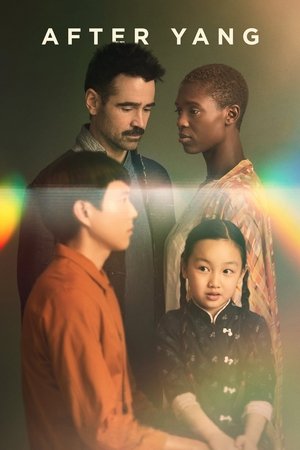
After Yang
I’m unsure what After Yang tries to accomplish (does it want to be a cautionary tale about the evils of privacy-violating technology? A gentle meditation on the nature of memory? The manifesto for a hypothetical AndroidLivesMatter movement?), but I do know that whatever it is, it fails – just like Jake (Colin Farrell) and Kyra (Jodie Turner-Smith) fail to parent their little daughter Mika (Malea Emma Tjandrawidjaja). The movie takes place in an indeterminate future where it is possible to buy “an older sibling for Chinese adoptions” (a possibility that is oddly specific). Some years before the events of the film, Jake and Kyra “bought Yang [Justin H. Min] to connect Mika to her Chinese heritage”; or, as Jake puts it, “teach her Chinese fun facts.” Pray tell, ¿why couldn’t they just have adopted two Chinese children, and have one be older than the other? Also, if they really want Mika to connect with her Chinese heritage, how about giving her a name that is, you know, Chinese? Though to be fair to writer/director Kogonada, I think Jake and Kyra are actually meant to be terrible parents; the real problem is that they don’t seem get any better at it by the end of the movie. But let’s start with the beginning; after what appears to be a nationwide, or maybe even worldwide, rhythm-matching game in which “over 30,000 families” participate (the opening credits are accompanied by a montage of the film’s characters and their families engaging in this competition, suggesting an entirely different movie than the one we are about to watch), Yang conks out, setting the plot, such as it is, in motion. Jake goes to a few places to have Yang repaired, and in the process the element of spyware is introduced, only to be quickly abandoned in favor of Yang’s “memory bank”. You see, “The memory banks allowed the technos [or techno-sapiens] to record a few seconds each day. The labs were trying to understand what technos considered memorable.” This raises a number of questions that the movie can’t be bothered to bring up, let alone answer. Are these “few seconds” all that the technos ‘remember’ from each day? And if so, does that mean that whatever they don’t record is as good as if it never happened? And wouldn’t that leave them with the memory retention of a goldfish (or that of Guy Pearce in Memento)? Not exactly the kind of carer I would want to entrust my infant daughter with. Moreover, since we only see Yang interacting with the other characters in random snippets that make his life seem like a Terrence Malick film, we are unable to piece together exactly why he was so important to them. All things considered, I would have been more interested in the Before and the During than in the After Yang.
